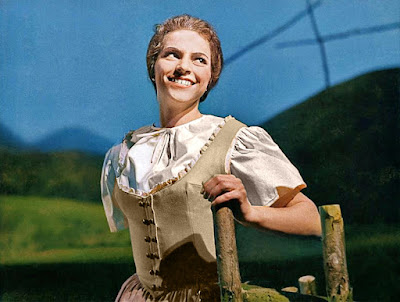 |
| A Prague staging of Ryba's Christmas Mass |
The most famous Czech musical tradition for the holiday is Jakub Jan Ryba's Christmas Mass, an enchanting work dating from 1796 that is still widely performed
This celebrated work is part of a tradition of pastoral carols - or pastorellas - that arose in the 18th century. Today we have a fine 1966 recording of the Mass as led by Vaclav Smetáček, plus a second (and equally outstanding) LP devoted to seven examples of the pastorella.
Ryba - Czech Christmas Mass
Jakub Jan Ryba (1765-1815) was a Czech teacher and composer of classical music. He was born near Plzeň. After graduation from school, he worked as a teacher and musician, before becoming the head of a school in Rožmitál pod Třemšínem, where he wrote his Czech Christmas Mass. He did well but was unhappy because of conflicts with the pastor and local council. Poor and exhausted, he committed suicide in 1815.
Let me call on Brian Kenety of Radio Prague for more about the Mass: "[Y]ou’d be hard pressed to find a Czech who doesn’t associate the season with composer Jakub Jan Ryba’s pastoral classic Christmas Mass ... it is the most popular piece of Czech Christmas music ever written. At this time of the year, it resounds in churches and concert halls around the country.
"[T]he Kyrie - Hej mistře, describes a village scene where a young shepherd wakes up his master to tell him about a strange heavenly light and wondrous music coming from afar.
"There are nine parts in all of the work, often described as a Christmas cantata, all based on pastoral motifs. Although it has the structure of a classical Latin mass, instead of taking place in Bethlehem, the scenes unfold somewhere in snow-covered Central Bohemia. Because of its folk character and simplicity, it was excluded from the traditional Catholic liturgy."
 |
| Vaclav Smetáček |
Our performance is a starry one, from the Prague Symphony and conductor Vaclav Smetáček (1906-86). He was chief conductor of the Prague Symphony Orchestra FOK (Film–Opera–Concert) from 1942 until the 1970s.
 |
| Jaroslava Vymazalová |
The talented cast including soprano Jaroslava Vymazalová, alto Marie Mrázová, tenor Beno Blachut and bass Zdenĕk Kroupa.
 |
| Helena Tattermuschová |
The LP also includes one example of a pastorella, Ryba's Sweet Nightingale, which also appears in the collection below, in an earlier recording. The soprano soloist here is Helena Tattermuschová.
LINK to the Czech Christmas Mass
Czech Christmas Pastorellas
Wiki tell us that pastorales "resemble a slowed-down version of a tarantella, encompassing many of the same rhythms and melodic phrases."
I think you will find that these pastorellas are characteristic of the baroque era, here well performed in striking 1954-55 recordings.
But what of their cultural significance? From Dr. Sp-El's cover notes: "Hundreds upon hundreds of carols from all parts of the country were preserved. Their lovely melodies are both pious and joyful, their texts poetic and witty. Children and adults hummed them and sang them and rejoiced in them and during the whole Christmas season they were sung in both homes and the churches."
 |
| Milada Šubrtová, heard in the Ryba pastorella |
For this recording, Ryba returns with his Sweet Nightingale, here called My Lovely Nightingale. Jiří Ignac Linek (1725-91) is represented by two works: Good Night, My Little Jesus and Pastorella Jucunda. The composer lived and worked in a small town in northern Bohemia as a schoolmaster, choirmaster and town scribe.
 |
| Jiří Ignac Linek |
 |
| Miluše Dvořáková, heard in the Skřivánek and Suchánek works |
The balance of the works are by composers of whom little is known. Tomáš Skřivánek provides his Pastorella in G, D. Milčinský a Pastorella a Tres Voces in A and a composer named Suchánek with his Cantus Pastoralis Pro Nativite Domine. The Milčinský is notable for being the only non-vocal work on the program.
 |
| Ladislav Šíp |
Conductor Ladislav Šíp was an official with Supraphon when these recordings were made. He became head of the opera of the National Theatre in Prague in 1973. From 1976–86 he was the director of the Prague Symphony Orchestra FOK, which again is the ensemble heard here.
LINK to Czech Christmas Pastorellas






Thanks for these records, Buster! I hope you and yours have a merry Christmas day tomorrow!
ReplyDeleteHi Buster.
ReplyDeleteHave a great Christmas, thank you for this and all the other wonderful stuff you post.
A
Buster, thanks for the Christmas albums and Merry Christmas.
ReplyDeleteRich
Hi Ernie, Andrew and Rich - Best wishes for the holiday season to you, and to all readers!
ReplyDeleteHope you are having a Merry Christmas and thanks again for al of the great music.
ReplyDeleteKeek - Thanks so much, and best wishes to you as well. Merry Christmas!
DeleteThanks for these lovely rarities
ReplyDeleteand above all HAPPY NEW YEAR dear Buster !!
Thanks, Jean - and all the best in the new year to you, too!
DeleteAce work on the diacritical marks for the Czech names! One rarely sees such accurate metadata. Happy New Year and thank you for everything you do!
ReplyDeleteThanks, Guy! Cut-and-paste and Character Map are my friends. Happy New Year to you as well!
ReplyDeleteBuster, thank you for sharing these! Although I do not comment often, I always appreciate the work you do in your written description. I continue to learn and appreciate with every post. Thank you for all of you shares. Have a healthy, happy new year!
ReplyDelete-Steve in PA
Steve - Thanks for your note! I hope you have a great New Year, too!
Delete